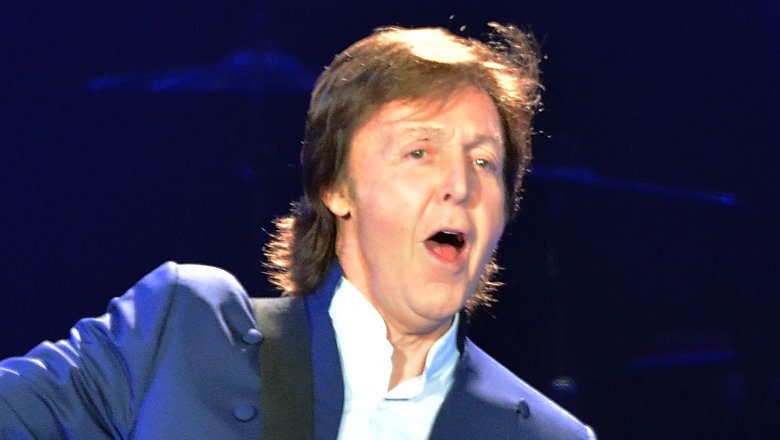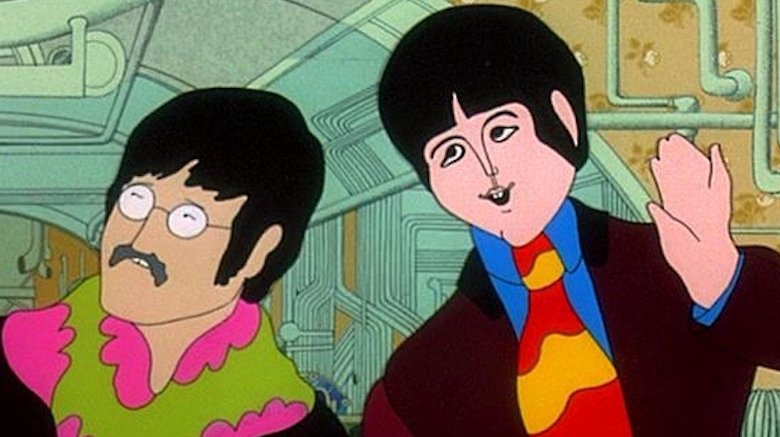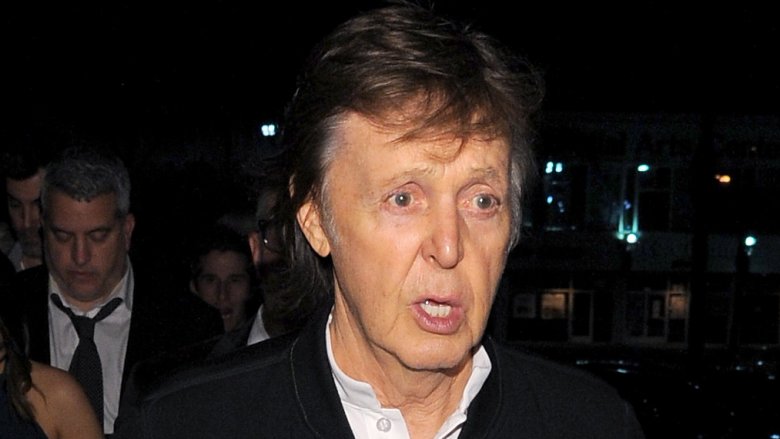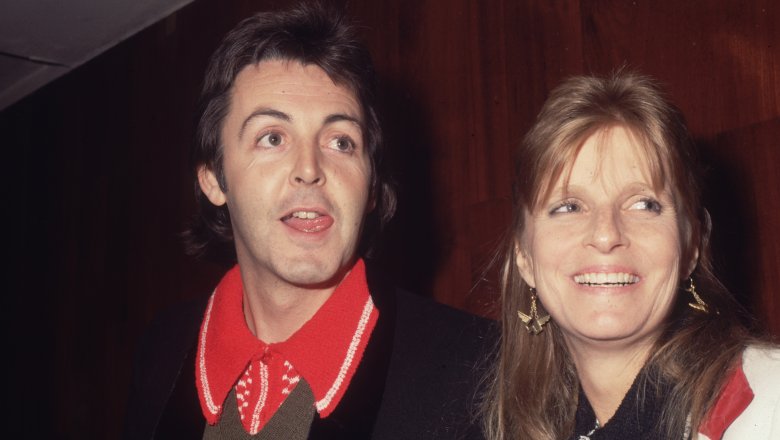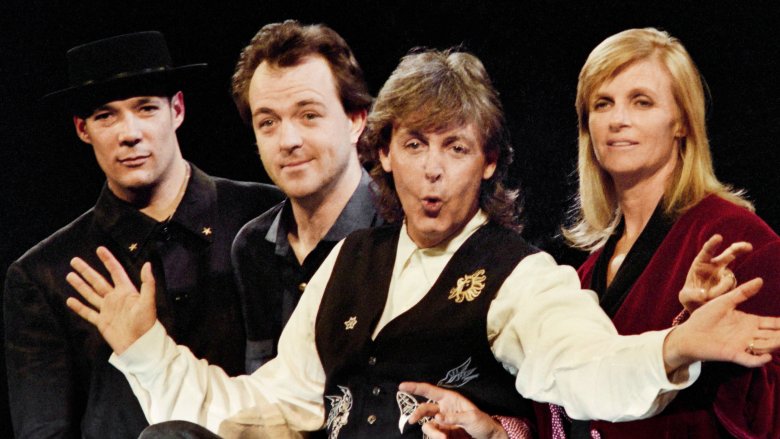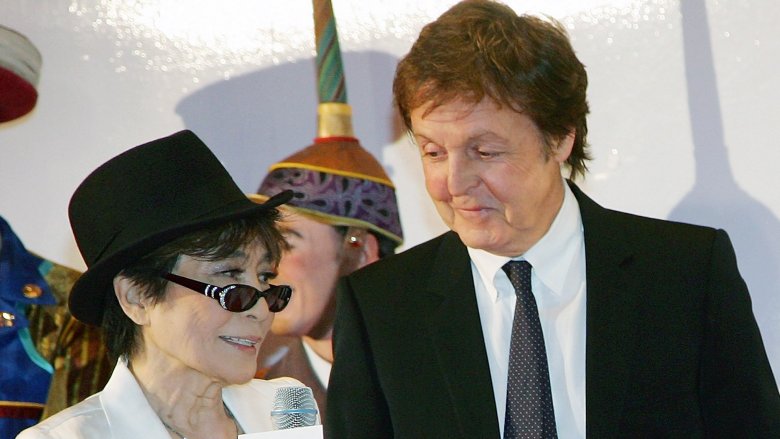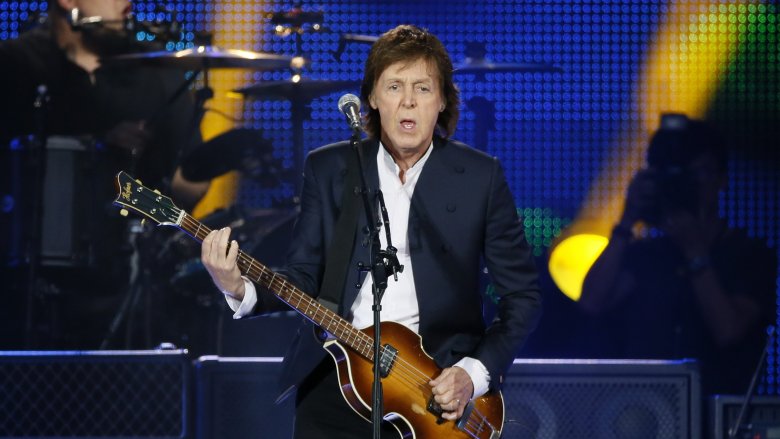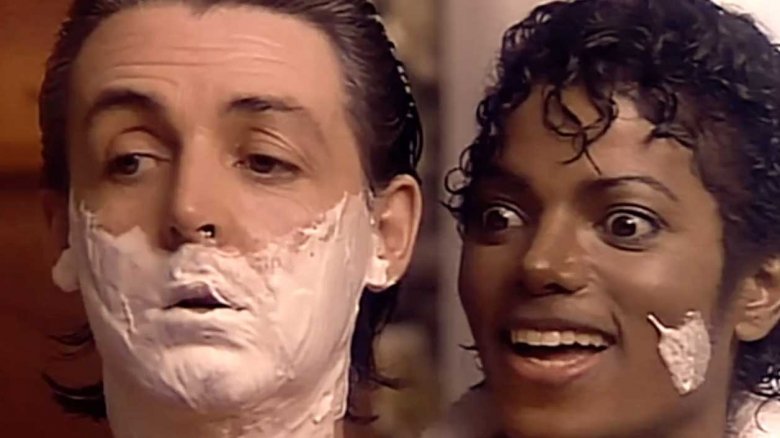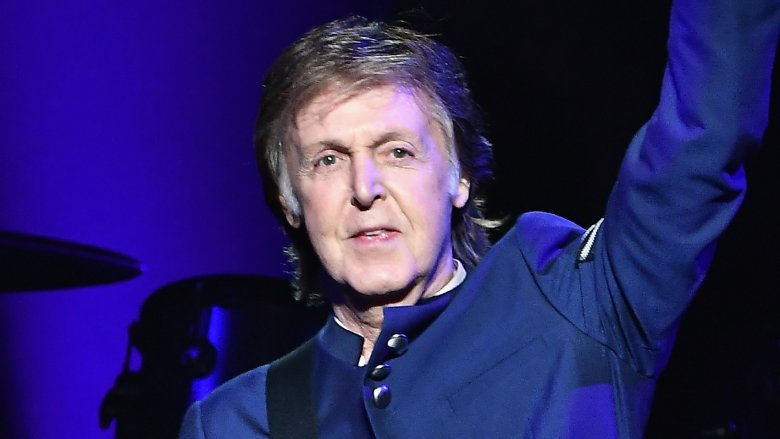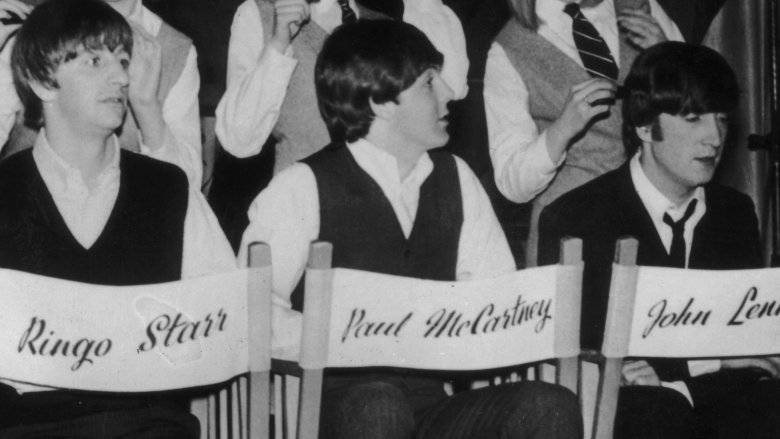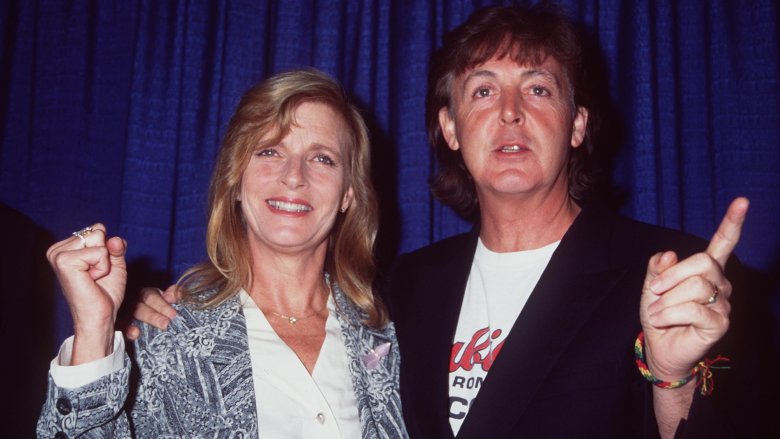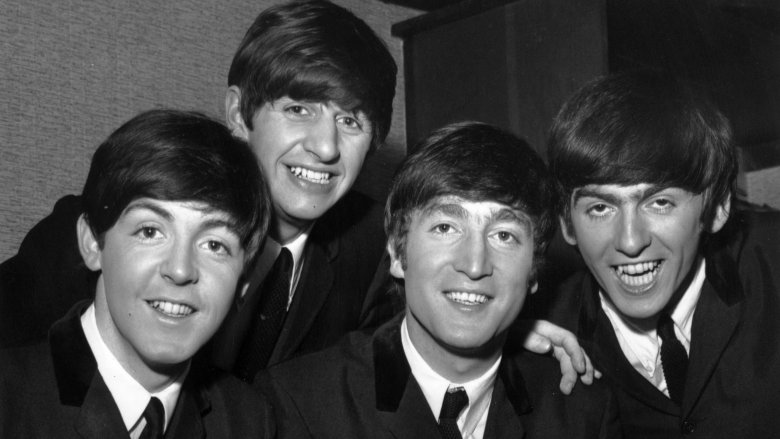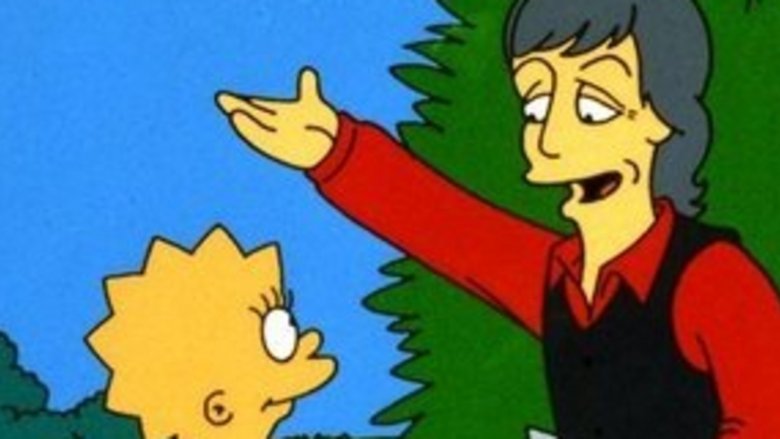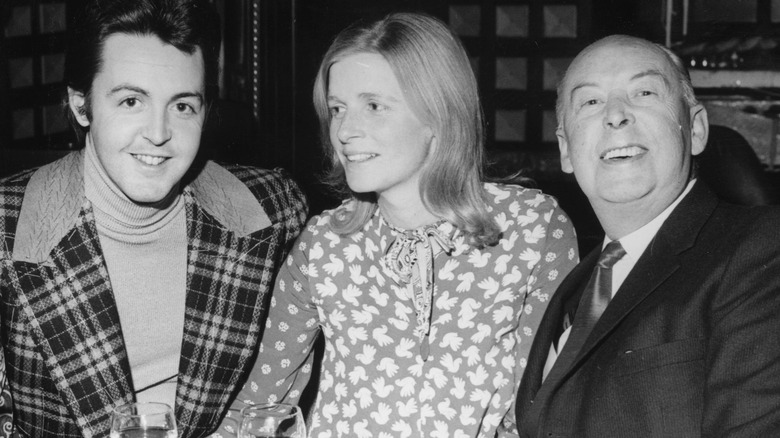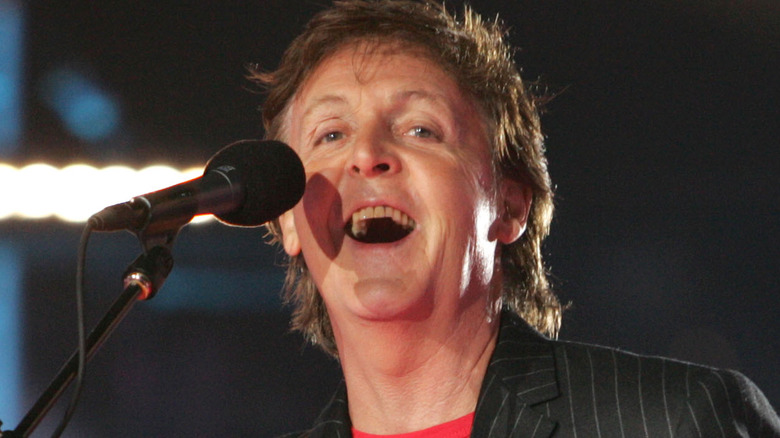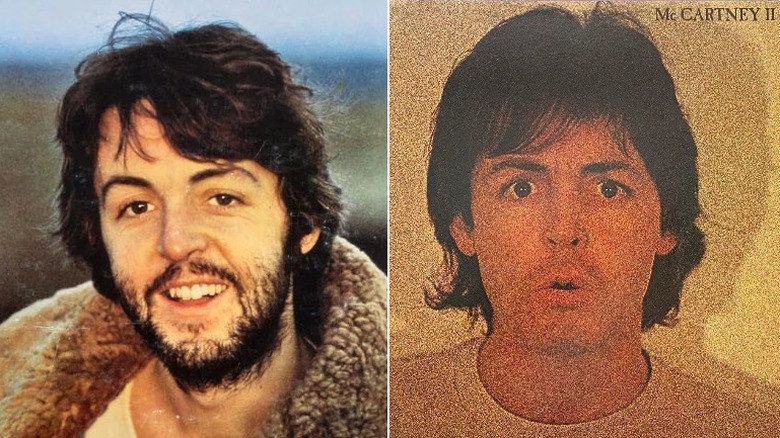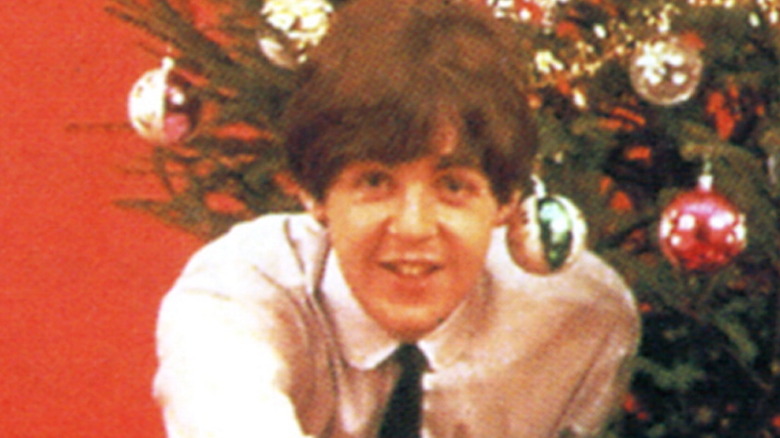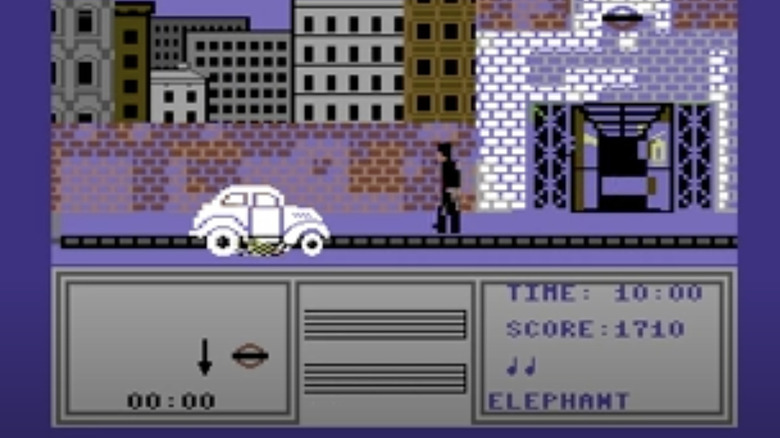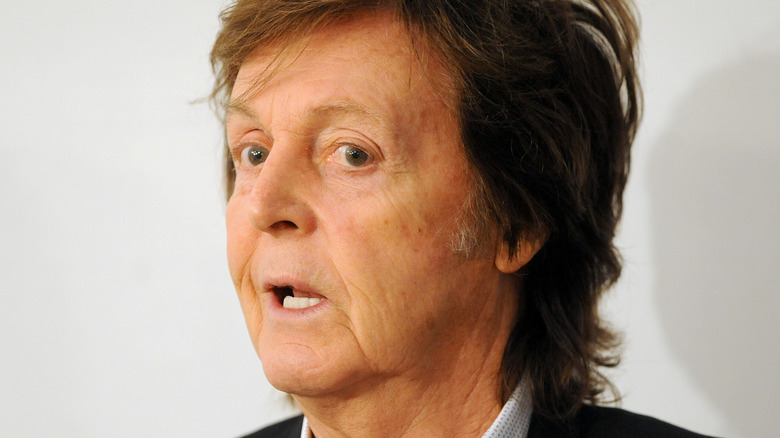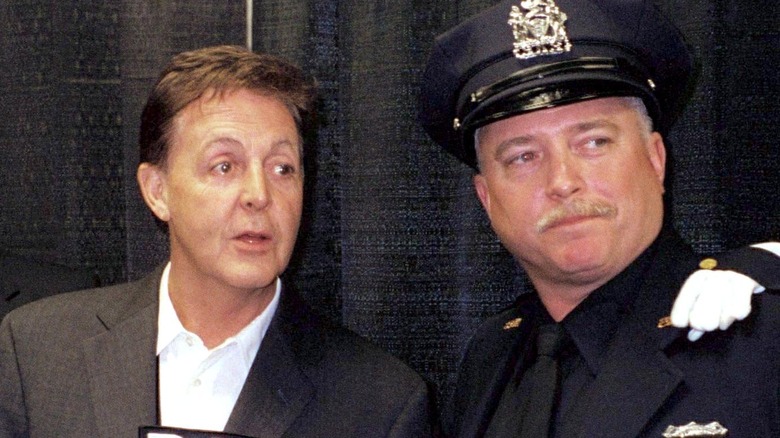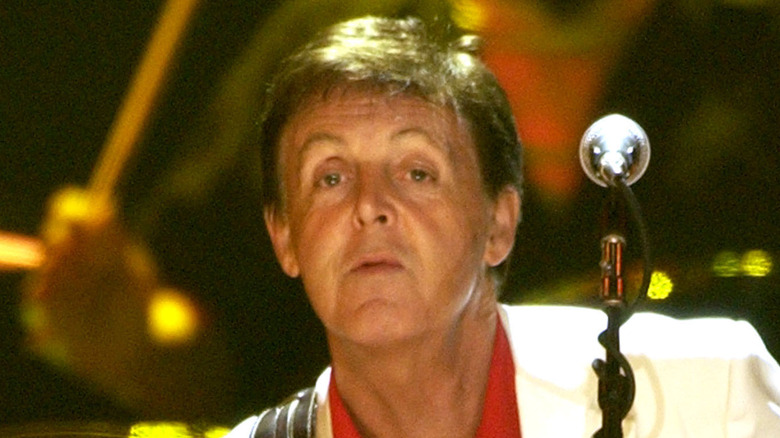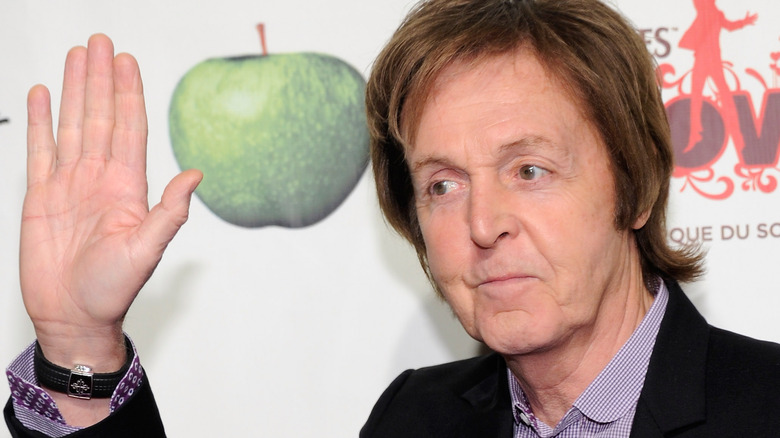The Untold Truth Of Paul McCartney
Paul McCartney just might be the greatest rock star of all time, if not also one of the most famous and well-liked people who has ever lived. After all, he was a freaking Beatle, a member of the most successful and influential rock band ever which changed music forever in the 1960s. While he certainly could have rested on those laurels and just wandered around the world demanding things by saying "I'm the cute Beatle," McCartney stayed curious, productive, innovative, and relevant.
After the Beatles split up, McCartney fronted Wings, one of the most popular bands of the '70s, and also embarked on a consistently successful and wildly disparate solo career. He's also got one of the most recognizable faces (and voices) on the planet, so he attracts attention everywhere he goes, both onstage and off. As the world is forever fascinated with anyone who had anything to do with the Beatles, here are some things even Beatlemaniacs or Wingsiacs (is that a thing?) may not know about Sir Paul McCartney.
He was a green giant for decades
Paul McCartney has always seemed like the most innocent Beatle — he doesn't even eat meat, and he's still spry enough to regularly perform even as he gets older. It's a little surprising, then, that McCartney was the first Beatle to enjoy drugs.
In an August 1964 meeting of minds, Bob Dylan hung out with the Beatles in a New York hotel and casually offered the Fab Four some marijuana. He thought it was no big deal, as John Lennon sang, "I get high" in their hit "I Want to Hold Your Hand." The lyric is actually "I can't hide," but hey, it would be rude to refuse, so each Beatle tried Dylan's joint. Only McCartney was blown away, remarking that pot got him "thinking for the first time, really thinking." As the Beatles' music got more druggy and experimental as the '60s wore on, marijuana explicitly influenced McCartney's songwriting. He's called "Got to Get You into My Life" an "ode to pot," for example.
Okay, so a lot of Baby Boomers smoked herb back in the groovy, far-out '60s, many moved on and stopped partaking of the illegal drug as they got older and evolved into yuppies. Not McCartney, who remained a loyal consumer of the sticky icky for decades. Sometime in the past few years, however, the "Let Me Roll It" singer hung up his rolling papers. "I don't do it anymore," he told the Mirror in 2015. "Why? The truth is I don't really want to set an example to my kids and grandkids. It's now a parent thing." He added that he now unwinds with "a glass of red wine or a nice margarita" like he was Jimmy Buffett or something.
Jailbird singing in the dead of night...
In 1960, the early Beatles honed their chops in smoky clubs in Hamburg, Germany. They got an offer to play at the Top Ten Club, and, it being "a much better" establishment than their usual spot (the Kaiserkeller), the band accepted the gig. Kaiserkeller manager Bruno Koschmider took nasty revenge, reporting George Harrison to the authorities for being under 18 and working without a permit. Meanwhile, Paul McCartney and drummer Pete Best went to move their stuff out of the apartment Koschmider also controlled. While there, they found a condom, and in a very punk protest of Koschmider's actions hung it on a nail inside the apartment and set it on fire. It burned itself out before long, but Koschmider reported McCartney and Best's "attempted arson" to the police. McCartney was arrested, spent three hours in jail, and then was deported back to England.
Another McCartney brush with the law: In 1980, he flew to Japan for an 11-date Wings tour. Upon his arrival at Narita International Airport in Tokyo, officials found about a half pound of marijuana in his baggage. That's enough to earn a smuggling charge — and a seven-year prison sentence — but authorities released and deported McCartney after holding him for nine days.
Who wouldn't want one's wife in Wings?
Like some kind of proto Dave Grohl, Paul McCartney fronted two enormously successful bands. Sure, Wings wasn't as popular as the Beatles, but who is? His '70s group churned out an impressive 14 top 10 hits in the U.S., including chart-toppers-turned-classic-rock-radio-staples such as "Band on the Run," "Silly Love Songs," and "Coming Up."
After some solo efforts in the early 1970s, McCartney decided to form a band, recruiting drummer Denny Seiwell and guitarists Denny Laine and Henry McCullough to form Wings. Also in the mix: McCartney's self-taught wife, Linda McCartney, on keyboards ... despite having no prior professional musical experience. Seiwell and Laine, seasoned musicians, resented that. In "Man on the Run: Paul McCartney in the 1970s," (via Billboard) Tom Doyle wrote that even in the band's early rehearsals "there were already murmurs of dissent within the ranks over Linda's role in the band." McCullough straight up suggested to his boss that he ought to fire and replace his wife, which McCartney resisted. However, he later admitted that during "a moment of irritation," he nastily told Linda he might get rid of her on keys and bring in frequent Beatles collaborator Billy Preston.
The difficult takeoff of a Wings album
"Band on the Run" is probably Paul McCartney's best work of the '70s. It's the only Wings album to rate on Rolling Stone's 500 Greatest Albums of All Time list, and it's one of the band's top sellers, probably because it's a hit machine — it produced "Let Me Roll It," "Helen Wheels," "Jet," and the epic title track. It's a joyful, rollicking record, which belies the peril McCartney and bandmates endured trying to make the thing.
They opted to record at a studio in Lagos, Nigeria. It was monsoon season, and Nigeria was also beset by political instability and high crime rates — one night Paul and Linda McCartney were mugged on the street, and the bandits stole the initial "Band on the Run" demo tapes. Then one day during a recording session, McCartney suddenly collapsed, and his bandmates rushed him to a hospital, believing he'd suffered a heart attack. It turns out it was a bronchial spasm, brought on by his prodigious cigarette smoking.
Then there was the opposition. Afrobeat icon Fell Kuti publicly accused McCartney of stealing and appropriating African music. McCartney cleared that up by inviting Kuti to the studio to hear some tracks. "He listens and said, 'Nah, of course you're not stealing from us,'" McCartney later told the Independent.
The ballad of Paul and Yoko
It's probably the biggest and most tightly held misconception in rock music history: Yoko Ono broke up the Beatles. She didn't, really; the Fab Four split in 1970 due to a combination of divergent creative interests and caving under the pressure of being the biggest band in the world. Ono, a Japanese-American conceptual artist and musician, bore the blame because John Lennon fell under her avant garde spell during the final years of the Beatles.
"We were kind of threatened. She was sitting on the amps while we were recording," McCartney told Rolling Stone. "Most bands couldn't handle that. We handled it, but not amazingly well, because we were so tight." While Beatles fans may still blame Ono for the band's demise, McCartney is well past it. He told Rolling Stone in 2016 that his relationship with Yoko is currently "really good, actually" and that they're "mates." (British for "friends," not like animals or pirates.) And he seems to have gotten over those negative vibes very quickly — in 1968, he contributed a blurb to the cover of Lennon and Ono's joint album "Unfinished Music No. 1: Two Virgins." "When two great saints meet, it is a humbling experience," McCartney wrote. He meant it, too. "My big awakening was, if John loves this woman, that's gotta be right. I realized any resistance was something I had to overcome."
His side gig is positively electric
Just about every surviving '60s and '70s rock star physically capable of holding a guitar is still out there, playing arenas and stadiums (if they're lucky) or casinos and county fairs (if they're really lucky), satisfactorily playing their 12 biggest hits each night. They might release a new album here and there, one that's safely and squarely in their classic rock wheelhouse. But Paul McCartney is no Eric Clapton or Eddie Money — he's still pushing musical boundaries and challenging himself to try new things.
McCartney first experimented with tape loops and trippy effects on the Beatles' "Tomorrow Never Knows," and in 1993 he (at first, anonymously) started an electronic music-heavy project called the Fireman. The group evolved over three albums from the bleeps-and-bloops into experimental rock, and his unlikely partner was Youth, aka Martin Glover, bassist in the '80s goth band Killing Joke. Around that time, McCartney and Glover collaborated with artsy Welsh band Super Furry Animals on an ambient record called "Liverpool Sound Collage," and with DJ/producer Freelance Hellraiser on the 2005 EDM release "Twin Freaks."
And in 2012, he teamed up with Krist Novoselic and Dave Grohl — the surviving members of Nirvana — to record and perform new music. Only a Beatle could truly replace Kurt Cobain, it would seem.
The doggone song is his
The early '80s saw two of music's biggest superstars — Paul McCartney and Michael Jackson — team up for some duets. Among them, McCartney dueled with Jackson on "The Girl is Mine," the leadoff single from "Thriller," and Jackson repaid the favor for "Say, Say, Say" off McCartney's "Pipes of Peace." (The songs went to No. 2 and No. 1, respectively, on the Billboard Hot 100.)
Not merely collaborators, Jackson and McCartney became friends, and, after "Thriller" dominated music upon its release in 1982 and became the best-selling album of all time, equals. Shortly thereafter, Jackson reportedly asked McCartney, one of just a handful of people who would understand, how to deal with his sudden, unbelievable wealth (via Liberty Voice). McCartney's advice: invest in music publishing or buy up the rights to as many famous songs as possible. Jackson took that advice to heart and bought a 50% stake in Northern Songs ... the publishing company that owned the Beatles' catalog. He beat out McCartney for the rights to his own songs. The Beatle felt so betrayed by the King of Pop that they never spoke again.
Hello, Paulie
Paul McCartney doesn't just control the rights to his own music and a lot of the songs he wrote and recorded during his time with the Beatles. He owns a music publishing company with the very dry and corporate name of MPL Communications — MPL stands for the even more corporate sounding McCartney Productions Ltd. Through that business umbrella, McCartney owns the usage rights to hundreds of songs that go back a century. Some of the songs are by McCartney's rock 'n' roll influences, while others are just well-known songs that were a good investment to purchase. Among the hits: "That'll Be the Day" by Buddy Holly," "Blue Suede Shoes," by Carl Perkins, and "Blue Christmas" made famous by Elvis Presley. In the latter camp: "Hello, Dolly!"
Some other McCartney musical holdings are just plain bizarre, particularly "My Mammy" by vaudeville icon Al Jolson, 1940s standard "Ac-Cent-Tchu-Ate the Positive," and "On, Wisconsin!" — the school song of the University of Wisconsin. This all means that anytime the radio plays "Blue Christmas" or the Wisconsin Badgers' marching band celebrates a touchdown, McCartney gets paid.
He ought to be in pictures
Paul McCartney isn't just a singer, songwriter, and bass guitar player — he's also an actor. McCartney played exaggerated versions of himself in "A Hard Day's Night" and "Help!," and in 1984 he starred in and wrote "Give My Regards to Broad Street." Also, It would seem that McCartney has been offered quite a few notable roles over the years ... which he declined.
In 1967, filmmaker Franco Zeffirelli began production on a big-screen adaptation of Shakespeare's "Romeo and Juliet"; he wanted McCartney to be his Romeo." I said, 'I can't do it, man, you're kidding. I'm just a musician,'" according to McCartney in "Conversations with McCartney." "He said, 'No, I really know you could do this. You look absolutely how I see Romeo.'" Ultimately, McCartney said he "bottled out," which must be '60s British slang for "ghosted."
In 2015, "Friends" casting director Leslie Litt told Huffington Post that she attempted to secure McCartney for the popular sitcom. In the fourth season, Ross was going to marry a British woman named Emily in London. The show really wanted the former Beatle and current British person to play Emily's father. Litt says she inquired through McCartney's manager, but he let her down himself with a faxed letter: "He thanked me for my interest and said how flattered he was, but it was a very busy time for him."
A wonderful moment on a very sad day
Paul and Linda McCartney were #CouplesGoals before that was ever a thing. First connecting in 1967, the former Linda Eastman, a renowned rock 'n' roll photographer, and McCartney, a musician of some popularity, married in 1969 and were thick as thieves ever since, playing in Wings and raising children together. According to Rolling Stone, they only spent about 10 nights apart their entire relationship — the period when Paul was detained in Japan for marijuana possession.
Tragically, Linda McCartney died at age 56 from complications relating to breast cancer in April 1998. Her memorial service (not a funeral; her husband had previously spread her ashes on their English estate) occurred in early June 1998 at the majestic Church of St.-Martin-in-the-Fields in London's Trafalgar Square. More than 700 mourners saluted McCartney by singing hymns and songs, including Paul McCartney's "Mull of Kintyre" and his Beatles contributions "Blackbird" and "Let it Be." In the wake of this sad day, a de facto rock reunion took place: George Harrison and Ringo Starr showed up to pay their respects and support their old bandmate. They all sang, which means Linda McCartney's funeral hosted a very tender and tragic Beatles reunion (which was not recorded).
Live from New York, it's the Beatles
In its first season, "Saturday Night Live," or as it was known at the time, "NBC's Saturday Night," was about the hottest thing in pop culture since the Beatlemania of 1964. Creator/executive producer Lorne Michaels jokingly attempted a huge publicity stunt on a March 1976 episode: He personally and directly pleaded with the Beatles to reunite on his show. "The Beatles are the best thing that ever happened to music," Michaels said, adding, "You're not just a musical group, you're a part of us." Then came the pitch: "The National Broadcasting Company has authorized me to offer you this check to be on our show. A certified check for $3,000." The joke is that the Beatles could've named their price to get back together, and it would've been for a lot more than three grand.
A few blocks away from NBC's New York studios where "Saturday Night" aired live, Paul McCartney was hanging out with John Lennon at his apartment in the Dakota building. They were actually watching SNL and saw Michaels make his offer ... and considered entertaining it. "John said, 'We should go down, just you and me. There's only two of us so we'll take half the money,'" McCartney said years later. "But it would have been work, and we were having a night off, so we elected not to go."
He made his mark on Springfield
One other place the Beatles reunited (well, sort of): "The Simpsons." In the '90s, all three then-living Beatles (John Lennon died in 1980), individually cameoed on the show you could reasonably call the Beatles of animated television. When Homer becomes a barbershop quartet superstar, he meets George Harrison at a music industry party; Ringo Starr writes Marge a long-overdue thank-you note for a portrait of him she mailed decades earlier; and in the 1995 episode "Lisa the Vegetarian," Paul McCartney and Linda McCartney encourage Lisa Simpson to embrace the meat-free lifestyle when she comes across them in "Apu's garden in the shade."
The former Wings members are famously vegetarian (Linda McCartney started a line of frozen meat-free entrees), and they voiced themselves in the episode on one condition: that Lisa's vegetarianism not be a phase, and that she commit to it for the duration of the series. "Simpsons" writers kept their word, and Lisa hasn't knowingly eaten so much as a big hunk of pork since.
Paul McCartney was strongly influenced by his father
The man known to millions as Paul McCartney isn't actually, fully named Paul McCartney. He was born James Paul McCartney, and to eliminate confusion, his parents called him by his middle name, he told his official website. Paul's father, James Sr., was nicknamed "Gentleman Jim" McCartney, according to Beatles biographer Philip Norman in Esquire, and his influence on his son's musical tastes and career would prove even more profound than forcing him to go by a different first name.
The cotton salesman, who alone raised Paul and his brother, Michael McCartney, after their mother died when the future Beatle was 14, instilled in his son an appreciation of show tunes, standards, and old-fashioned brass bands. That appreciation showed itself in the latter years of the Beatles, when Paul composed British music hall-type ditties like "When I'm 64." That song appears on the Beatles' 1967 LP "Sgt. Pepper's Lonely Hearts Club Band," a concept album in which Paul and the rest of the Fab Four adopt the personas of an old uniformed, brassy jazz group. According to Norman, the fictional Sgt. Pepper's Lonely Hearts Club Band is a direct tribute to a jazz combo in which Jim McCartney played in the 1920s.
'Yesterday' came to Paul McCartney in a dream
In early 1965, while staying in the family home of his girlfriend at the time, Jane Asher, Paul McCartney woke up with a melody on his mind. He immediately went to the piano in the room and played what his brain had cooked up while he'd been sleeping. "It was just all there. A complete thing. I couldn't believe it," he said in "A Hard Day's Write," by Steve Turner.
McCartney thought the tune was so fully realized that it must have been a pre-existing song he'd heard somewhere before. "For about a month, I went round to people in the music business and asked them whether they had ever heard it before," he said. But nobody had. So, he got to work writing words to match the music. His first draft of the song's opening lyrical hook: "Scrambled eggs, oh you've got such lovely legs." By June 1965, such placeholder lyrics had given way to final ones, which suggested a one-word title: "Yesterday." It became one of the Beatles' most popular and enduring songs, going to No. 1 on the American pop chart.
Stress led him to record two true solo albums
John Lennon split from the Beatles in 1969. Rather than officially break up the band right away, Paul McCartney headed to his home studio. In response to the professional tension, McCartney recorded a solo album, "McCartney," doing everything himself except for wife Linda McCartney's vocal harmonies and keyboard licks. On April 10, 1970, McCartney announced that he'd left the Beatles, effectively ending the group. Ten days later, McCartney launched his solo career when "McCartney" hit stores.
In the late 1970s, after McCartney again faced extreme stress, he once more focused his attention on an expressly solo album. After he was arrested in Japan for drug smuggling (he had half a pound of marijuana in his luggage), McCartney faced a sentence of seven years hard labor. He'd ultimately serve several days in an isolated jail cell, and upon his release and the cancelation of his tour, he retreated to his home studio in England to make an experimental album largely reliant on synthesizers. Named after his last solo project, "McCartney II" yielded the singles "Temporary Secretary" and "Coming Up," and McCartney played almost every bit of music on every track himself, except for small contributions from Linda McCartney.
Christmas is a very lucrative time for Paul McCartney
Counting up all the work he did for the Beatles, Wings, his solo career, covers by other artists, compositions he gave to others, and even works he contributed to of other artists, Paul McCartney has topped the charts consistently. That makes him one of the most objectively successful songwriters.
But the one song that earns McCartney the most money, year after year, is one that never reached No. 1 in the U.S. or the U.K. Released as a standalone, non-album single in late 1979, "Wonderful Christmastime" is a recurrent modern holiday standard. McCartney wrote, produced, and played all the instruments on the synth-driven nostalgia trip. That entitles McCartney to nearly all the royalties the song generates, and they're substantial. Each year, McCartney makes between $400,000 and $600,000 on "Wonderful Christmastime," according to an industry source speaking to Forbes.
He makes video games
"Give My Regards to Broad Street" wasn't just another entry in Paul McCartney's extensive canon of solo albums. The 1984 record was one part of an ambitious multimedia extravaganza that notably ushered the pop star into the world of video game production. The LP served as the soundtrack to "Give My Regards to Broad Street," a film that McCartney wrote and starred in as himself. The plot: McCartney must locate the stolen masters of his latest album. That action-packed scenario is also the basis of "Give My Regards to Broad Street," a video game released for the Commodore 64 and ZX Spectrum home computers. This wasn't some cheap, albeit early, tie-in video game, either — McCartney took an active role in development. "He was very supportive and easy to work with, whilst keeping us on our toes on the design side," Argus Press software executive Ron Harris told Wireframe (via Time Extension). McCartney was particularly a stickler about making sure the video game's music didn't sound cheap or off.
From 2010 to 2014, McCartney spent four years helping compose the score for the Bungie/Activision shooter game "Destiny." He also employed a 120-piece orchestra to record an original "Destiny" theme song, which he then released as a single.
He can't read music, but he wrote classical music
Paul McCartney is one of history's most successful songwriters. He wrote or co-wrote 129 hit singles, and yet his ambition and curiosity overpower his technical limitations. For all that McCartney has created, he's done it without the ability to read or write music. "It's embarrassing," he told "60 Minutes" in 2018. "None of us in the Beatles. We did some good stuff though. But none of it was written down by us. It's basically notation. That's the bit I can't do." McCartney explained that he interprets and expresses music more like a feeling or a thought.
Nevertheless, McCartney has worked in the milieu of some of the most traditional and technically minded music out there: classical. In 1991, he released "The Liverpool Oratorio." A complicated instrumental work requiring arrangements for dozens of musicians, McCartney worked on the project with composer and conductor Carl Davis and the Liverpool Philharmonic Orchestra.
He organized the 9/11 benefit concert
On September 11, 2001, Paul McCartney sat in a London-bound airplane as it prepared to take off from New York's JFK Airport. Through a window, he saw an airplane strike one of the towers of the World Trade Center in Manhattan. "I said that's an optical illusion. It's probably just some sort of little fire," McCartney recalled to The Hollywood Reporter. And then a flight attendant approached McCartney to escort him off the plane. All flights were grounded, and McCartney couldn't return to London to celebrate his daughter Stella's 30th birthday, as per The Guardian, so the musician wound up stranded on Long Island in a hotel room watching the news as the events of 9/11 unfolded. "While I was out there twiddling my thumbs, I began to think, 'Is there something we can do?'"
Inspired by charity concerts he witnessed as a child in post-World War II England, McCartney decided to put together a concert to benefit the victims of 9/11. Immediately recruiting David Bowie, Pete Townshend, Mick Jagger, and Elton John, McCartney was instrumental in mounting The Concert for New York City. The October 20, 2001, event raised $30 million for the Robin Hood Relief Fund. In April 2002, when McCartney returned to New York to play two shows at Madison Square Garden, NYPD representatives presented McCartney with an honor as thanks for arranging The Concert for New York — they made him an honorary police detective.
Paul McCartney was the first Beatle in space
No space agency on the planet, government-funded or private, has yet to launch a rock star into space. But when they do, they'll take a path that Paul McCartney helped forge. In November 2005, McCartney took some time out during a concert in Anaheim, California, to play the Beatles' favorite "Good Day Sunshine" and his solo song "English Tea." The performances of both tunes were beamed live to the International Space Station. While the Anaheim crowd received the songs with applause and cheers, the interlude was set up as a wake-up call with an intended audience of two: American astronaut Bill McArthur and Russian cosmonaut Valery Tokarev.
That two-song mini-set made history. It was the first time that a concert was beamed into space, specifically to the ISS, which hovered 220 miles above the Earth. "I can't believe that we're actually transmitting to space!" McCartney said, as per the Associated Press (via Today). "This is sensational. I love it."
Paul McCartney vs. Apple
In 1968, the members of the Beatles established Apple Corps, an umbrella company to manage its business affairs. In 1978, Apple Corps sued upstart tech company Apple Computer, alleging trademark infringement. As part of a 1981 settlement, the computer Apple had to pay the music Apple $80,000 and agree to never participate in the selling of music. A decade later, after Apple Macintosh computers came bundled with digital music software, Apple Corps sued again; Steve Jobs' company paid Paul McCartney's company $26.5 million and once more swore to not use the word "Apple" to sell music. Apple Corps alleged that the other Apple violated that agreement in 2003 upon the opening of the Apple Music Store, which sold digital music files to consumers looking to fill their Apple iPods. That legal matter ended with Apple Inc. agreeing to license some apple-based signage from Apple Corps. It also allowed for the Beatles' catalog to finally make its long-delayed debut on the Apple Music Store in 2010.
Through it all, Apple head Jobs remained a massive Beatles fan, and despite the lawsuits, he and McCartney became friends. "I feel privileged to have known him," McCartney said in a statement after Jobs' death in 2011 (via Rolling Stone). "He came to quite a few of our concerts and it was always a pleasure to see him bopping on the sidelines."
